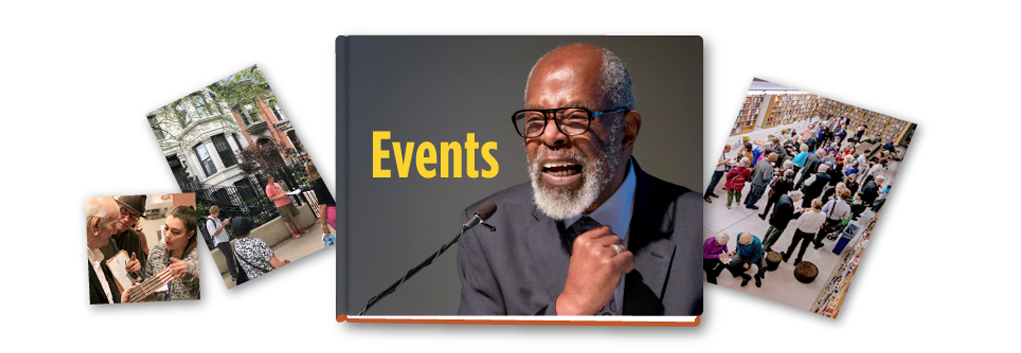Storm Takes Logan Center by Poetry Anthology
Wednesday, June 22, 2022
By Donald G. Evans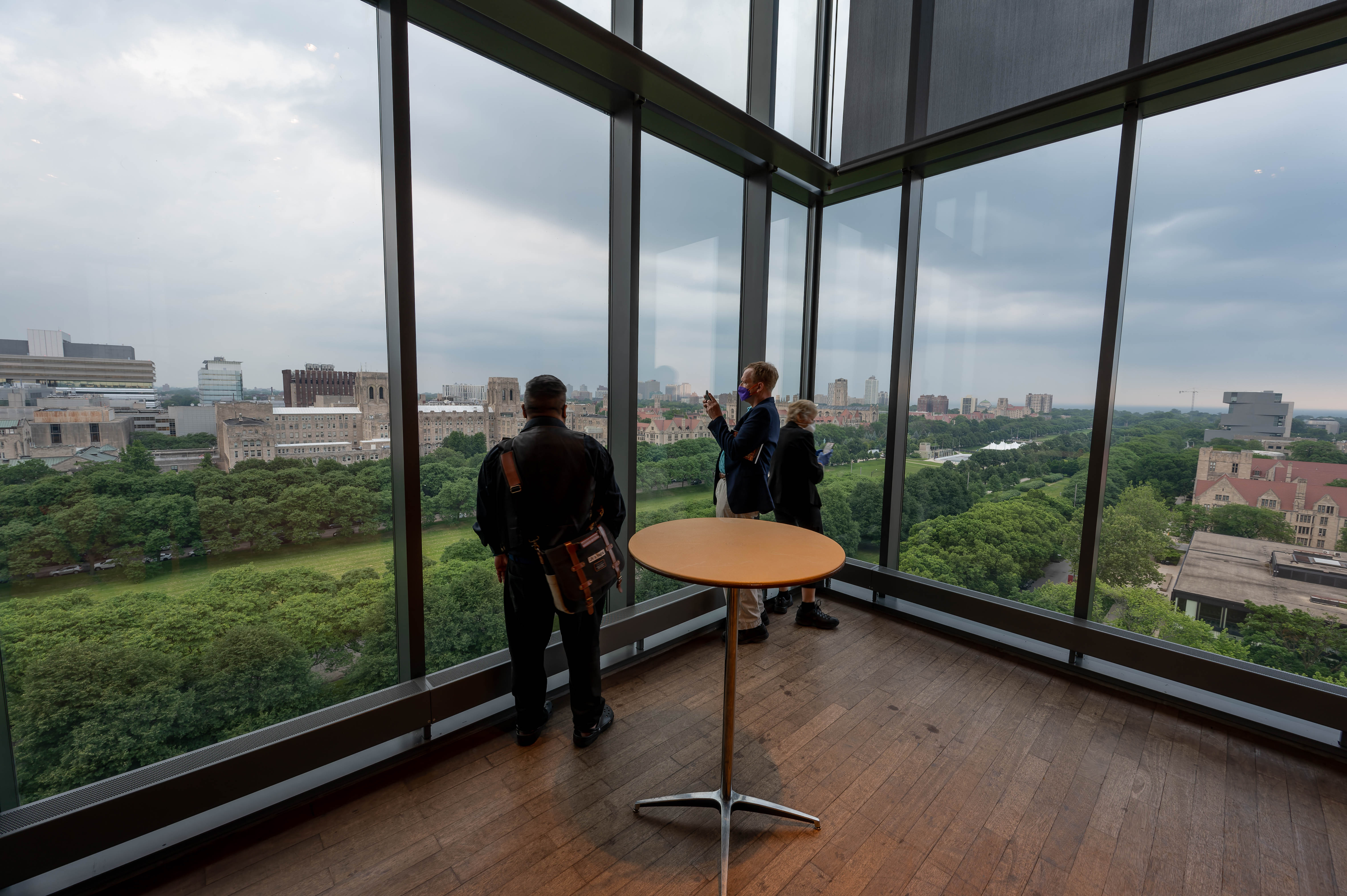
From the Logan Center’s 9th floor, you can look out across Hyde Park all the way to the skyline, watch the horizon twinkle and roar and blush. But I wasn’t looking. I stationed myself in the small room outside the penthouse—a kind of vestibule with no windows—to greet guests as they arrived for the launch of Wherever I’m At: An Anthology of Chicago Poetry.
Monday, June 13: the official publication date. This date means little to the average book reader—currency impacts our interest in a title only as much or little as many other factors. But the literary world’s apparatus, much like Hollywood, relies in an obsessive way upon this date. In a week or two, a vast majority of media, including major review publications, will have moved on. It’s not the way it should be, but it’s the way it is. So this party, this launch, was our chance—our only chance, maybe—to gain traction. With so many new books entering the ecosphere daily, we had this one day, more or less, to announce ourselves.
Many who arrived were poets and artists who’d contributed to the book. I wanted them to sign my book and four others—one for the Chicago Literary Hall of Fame archives, three more for future auctions. These were limited edition hardcover copies. With 161 total contributors, trying to get a book complete with all the signatures is like a rigged carnival game—it looks like you can win, but you can’t. Still. The best chance is to grab a bunch of autographs in one place at one time, and the key is, you can’t let anybody escape without signing.
Faisal Mohyudden, the great poet, stood in front of me, chatting, while a group that included poet Marta Collazo and artist Priscilla Huang dutifully scratched out their signatures in a kind of assembly line forming to my right. Contributors like Virginia Bell and Dmitry Samarov, along with other guests, found their way to the food table to spear a meatball or sample a cookie, sauntered over to the drink table for a bubbly lemon water or a glass of red wine. Jazz cords filtered into the corridor as the band warmed up for its first set. A large contingent of Chicago Literary Hall of Fame board members, Associate Board members, Advisory Council members, volunteers and interns were still fussing with arrangements and overseeing details. Conversations were already taking place in all corners of the space, the cacophony of voices rising. We were just a few minutes from the announced start time.
Then: a siren shrieked outside. Dozens of phones blared inside. My phone sounded its own warning. Then it rang: my mom wanted to know if I was safe. It rang again: Rose Perkins reported that Haki Madhubuti, one of our speakers for the evening, couldn’t leave his house. It was then I saw all the text messages from the past twenty minutes. “Are you cancelling the party?” “So sorry: I won’t be able to make it.” “Are you going to reschedule?” “It’s bad out there.”
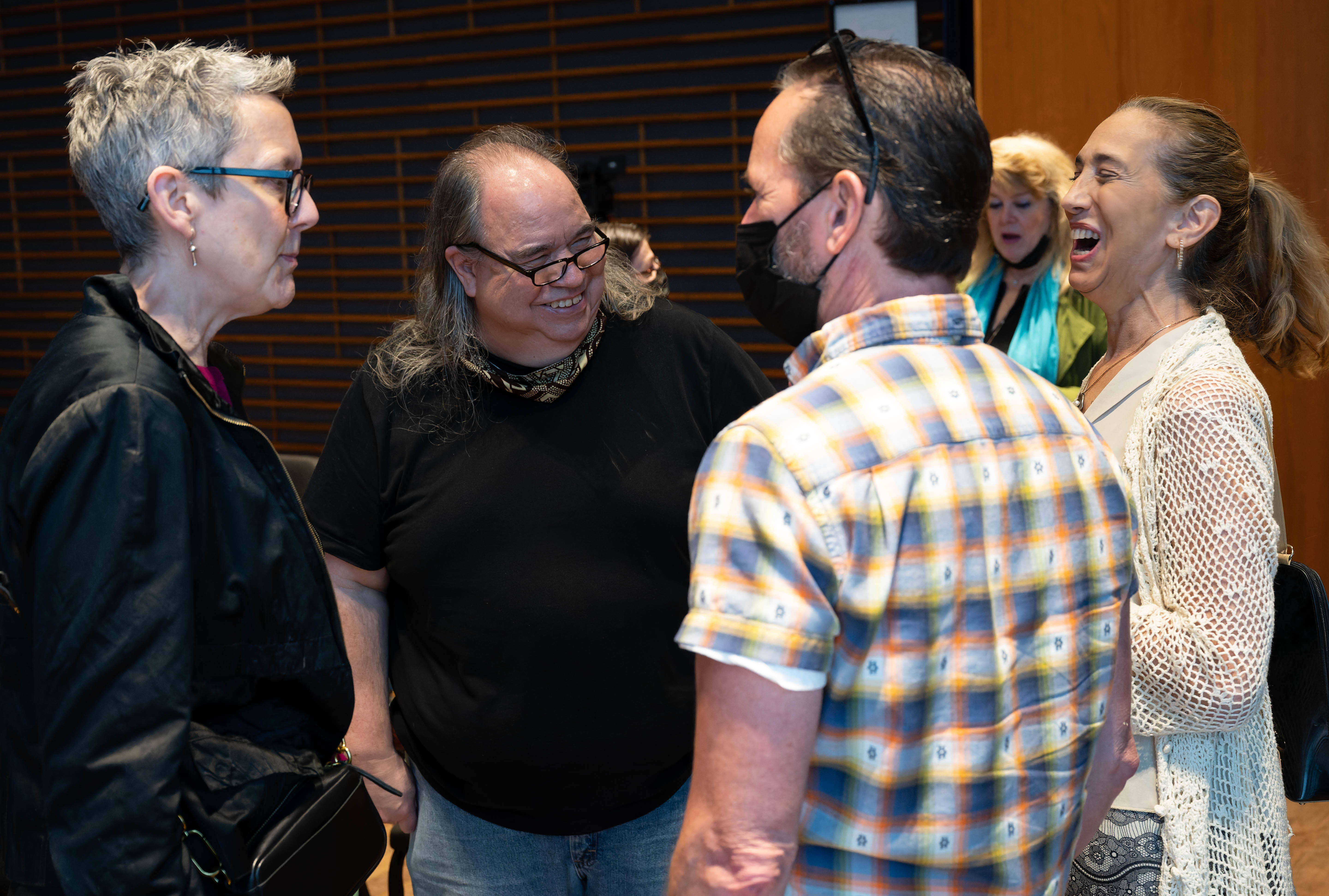 Everybody knew at once: the party had literally been taken by storm. Mashaune Hardy, assistant director of partnerships and strategy for the University of Chicago's Logan Center, took charge. She was a woman who looked like she routinely oléd two storms before sunrise without skipping her breakfast. She gently informed everybody that we were evacuating and herded party goers into the elevator. Kelci Dean and Brian Clancy thought to grab some books to sell downstairs, though we’d learn soon enough that our internet connection had been severed. Salli Berg Seeley rounded up the five master books so she could keep securing signatures. Don Seeley kept snapping photographs. A few people took an extra beer or plate of food. Elevator after elevator made the descent to the lower level, ten or 11 or 12 trips with a half-dozen people.
Everybody knew at once: the party had literally been taken by storm. Mashaune Hardy, assistant director of partnerships and strategy for the University of Chicago's Logan Center, took charge. She was a woman who looked like she routinely oléd two storms before sunrise without skipping her breakfast. She gently informed everybody that we were evacuating and herded party goers into the elevator. Kelci Dean and Brian Clancy thought to grab some books to sell downstairs, though we’d learn soon enough that our internet connection had been severed. Salli Berg Seeley rounded up the five master books so she could keep securing signatures. Don Seeley kept snapping photographs. A few people took an extra beer or plate of food. Elevator after elevator made the descent to the lower level, ten or 11 or 12 trips with a half-dozen people.
Then we were all downstairs. Mashaune opened up some space for us to socialize and be comfortable. There were pods of people that knew each other, autograph seekers trying to id artists, a group huddled in front of the Matisse jazz prints. Another group took advantage of the classroom Mashaune had thrown open. Lots of weather reports. “It looks like we’ll be able to go back upstairs at 7:45.” “They just updated the severe storm warning: it’s until 11 now.” “It’s a torrential downpour out there.”
At first, the stress was enormous, like in that moment when your hat flies into the lake and a million desperate plans to save the hat flash into and out of your head as you watch it slowly sink out of sight. When the hat goes, so does the stress. “It was my FAVORITE hat…but it’s just a hat.” The party, as we had envisioned it, was ruined. Okay. I had a full glass of wine and so did others: that was good. I assume that it’s generally discouraged to wander about the building with food and drink that might be spilled or splattered or thoughtlessly discarded. But natural disasters make their own rules.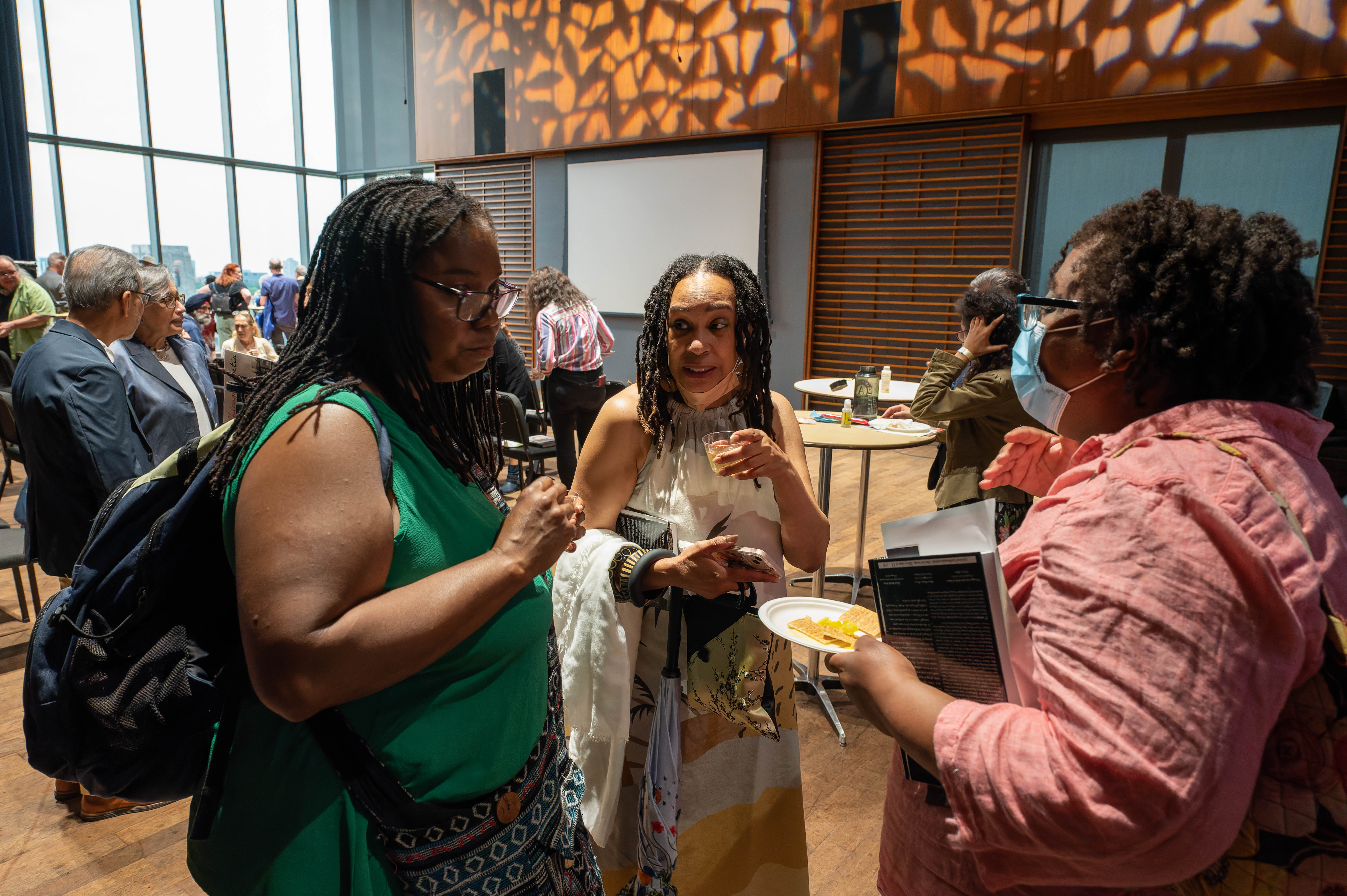
As I looked around, I saw that people were having a good time. Talking about the book, talking about poetry, enjoying and making friends, pitching in to make sure we were doing whatever we could to make this occasion worthy.
This wasn’t a disaster—in any way. Some trees, we’d learn later, would be lost, but no lives. Streets and parks were damaged but not beyond repair. Everybody inside was safe. Everybody was leaning into the night.
Crisis brings out the best or worst in people. It was an important event—an expensive one, too—and everybody there knew that. People who’d traveled a fair distance to be there, like Marianne Boruch and her husband David, bubbled with enthusiasm, not complaint. People whose purpose there had been undermined, like musician Cole DeGenova and videographer Rana Segal, improvised their parts. The official party organizers, like Susan Dennison, were joined by unofficial helpers. The room was filled with good will and generosity, more so, even, than had the party gone as planned.
We did make it back up to the 9th floor. Beatriz Badikian-Gartler, Ugochi Nwaogwugwu, and Mark Turcotte gave powerful readings. Barry Jung gave a really nice toast. The band got to play just a little. We gobbled and guzzled what we could in what time we had.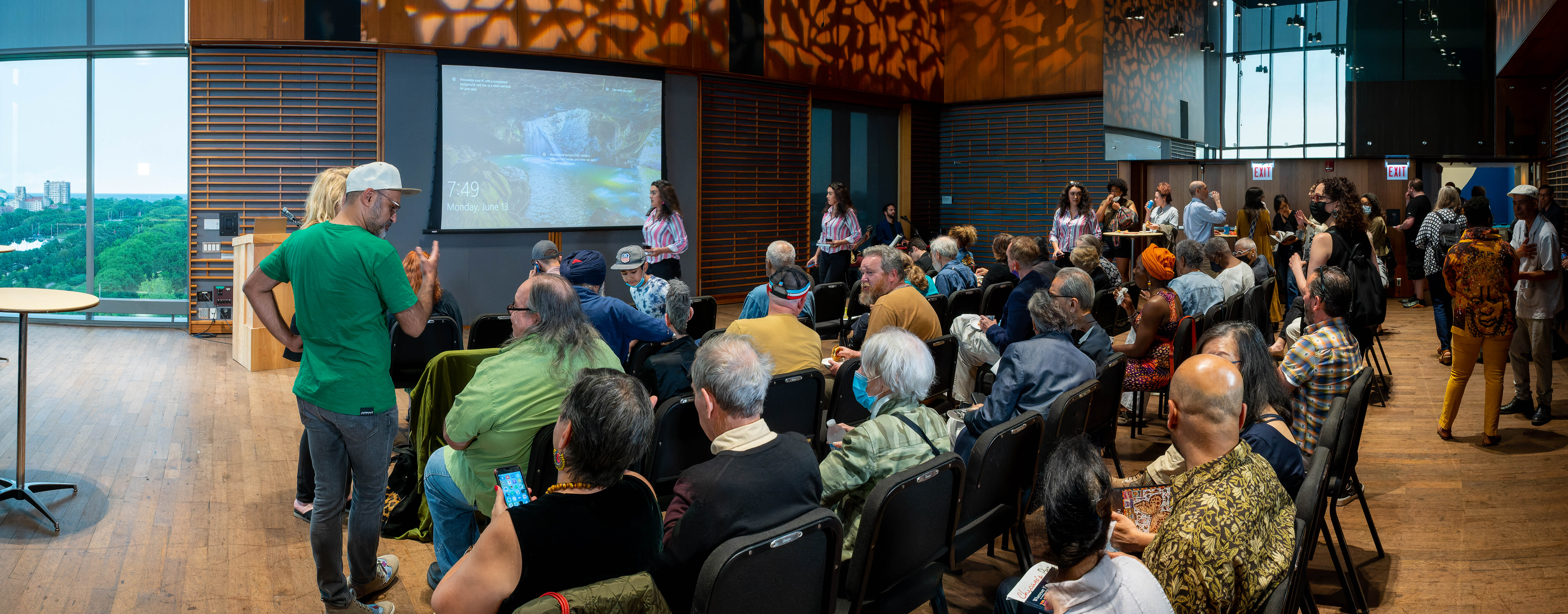
Ultimately, what I love about Wherever I’m At is the high character and deep empathy of the contributors. Their poems and artwork resonate with a Chicago working hard to be its best self. And here they were, along with their new readers, using those qualities to make a potentially awful situation joyous. As far as a showcase for the new book, this turned out to be just right.
Donald G. Evans is the author of a novel and short story collection, and editor of two anthologies, including Wherever I’m At: An Anthology of Chicago Poetry. He is the Founding Executive Director of the Chicago Literary Hall of Fame.


